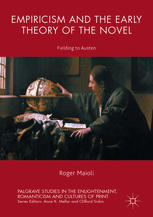

Most ebook files are in PDF format, so you can easily read them using various software such as Foxit Reader or directly on the Google Chrome browser.
Some ebook files are released by publishers in other formats such as .awz, .mobi, .epub, .fb2, etc. You may need to install specific software to read these formats on mobile/PC, such as Calibre.
Please read the tutorial at this link. https://ebooknice.com/page/post?id=faq
We offer FREE conversion to the popular formats you request; however, this may take some time. Therefore, right after payment, please email us, and we will try to provide the service as quickly as possible.
For some exceptional file formats or broken links (if any), please refrain from opening any disputes. Instead, email us first, and we will try to assist within a maximum of 6 hours.
EbookNice Team

Status:
Available0.0
0 reviewsThis book is about the empiricist challenge to literature, and its influence on eighteenth-century theories of fiction. British empiricism from Bacon to Hume challenged the notion that imaginative literature can be a reliable source of knowledge. This book argues that theorists of the novel, from Henry Fielding to Jane Austen, recognized the force of the empiricist challenge but refused to capitulate. It traces how, in their reflections on the novel, these writers attempted to formulate a theoretical link between the world of experience and the products of the imagination, and thus update the old defenses of poetry for empirical times. Taken together, the empiricist challenge and the responses it elicited signaled a transition in the longstanding debate about literature and knowledge, as an inaugural round in the persisting conflict between the empirical sciences and the literary humanities.